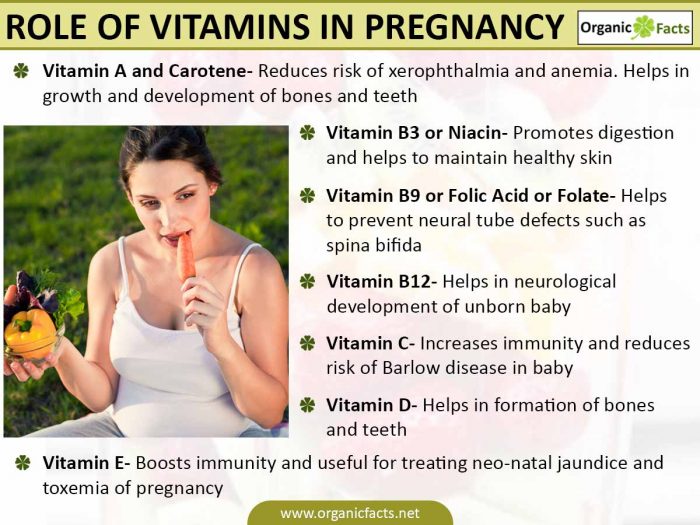A healthy diet contains most of the necessary vitamins. These vitamins give the body essential nutrients that are required, especially during pregnancy. Also, it helps pregnant women to stay healthy and repair damages, if there are any. According to a recent study, w [1]omen with poor diets before pregnancy are more likely to give birth prematurely than women who have healthy diets. So a balanced healthy diet is required during pregnancy to ensure good health of the mother and baby. The food for a healthy diet during pregnancy should include fruits and vegetables, dairy products, poultry, whole grains (breads and pastas), beans, fish with a low mercury level, and lean red meat. This article discusses the role of vitamins during pregnancy and various food varieties that contain those vitamins. It would help expecting mothers to include the right variety of food in their meals.
Role of Vitamins in Pregnancy
Vitamins help in the normal functioning of the human body. It becomes all the more important during pregnancy. The diet of a pregnant woman should comprise different food varieties, including vitamins, minerals, proteins, fats, and carbohydrates. These provide proper nutrients required for the development of the baby and the health of pregnant women. However, it is also very important to take appropriate amounts of these vitamins and minerals during pregnancy.

Having a wholesome diet during pregnancy helps in healthy baby birth. Photo Credit: Shutterstock
Vitamin A and Beta Carotene
Vitamin A and beta carotene both help in the development of bones and teeth. Approximately 770 mcg of vitamin A and beta carotene is required by pregnant women. It is mainly present in milk, eggs, potatoes, carrots, pumpkin, cantaloupe, spinach, broccoli, green and yellow/orange vegetables, and yellow/orange fruits. Other foods such as salmon, as well as fortified breakfast cereals, are a good source of vitamin A. [2]
Research suggests that vitamin A deficiency is very rare in women and newly born babies. This vitamin is known for aiding a healthy reproductive system. For malnourished women, vitamin A is effective in reducing problems during or after pregnancy. A deficiency of vitamin A may cause xerophthalmia in pregnant women and increase the risk of anemia, and may lead to slow infant growth. [3] [4]
Vitamin B1 or Thiamin
Vitamin B1 or thiamin is required to increase energy levels and regulating the nervous system. A deficiency of this vitamin in pregnant women can cause Infantile Beriberi in the newborn baby. Babies are usually affected with this disease through their mother’s milk. Low levels of vitamin B1 may also cause peripheral neuritis or inflammation of the nerves outside of the brain. It is found in whole grain cereals, wheat germ, fortified cereals, kidney beans, Brussels sprouts, eggplant, tomatoes, spinach, mushrooms, green peas, nuts, legumes, pasta, rice, eggs, organ meats, and pork. Approximately 1.4 mg of vitamin B1 is required by pregnant women. Do not overcook your food and don’t refrigerate it for a longer duration, since it can destroy this vitamin. [5]
Vitamin B2 or Riboflavin
Vitamin B2, also known as riboflavin, maintains healthy skin, good eyesight, and proper energy levels. It is mainly found in dairy products, eggs, meat, fish, poultry, broccoli, avocado, mushrooms, dried peas, millet, beans, green leafy vegetables like spinach and asparagus, and fortified cereals. Approximately 1.4 mg of vitamin B2 is required by pregnant women. This vitamin is very important for a healthy pregnancy, as it ensures the development of the reproductive organs and body tissues. [6]
Vitamin B3 or Niacin
Vitamin B3 is also known as niacin. Approximately 18 mg of vitamin B3 is required during pregnancy. It not only promotes the nerves and digestion, but also helps to maintain healthy skin. Vitamin B3 is found mainly in high protein food, legumes, curd, brown rice, potatoes, eggs, peanuts, fortified cereals, brewers’ yeast, cheese, breads, barley, oats, fish, meat, and milk. [7]
Vitamin B6 or Pyridoxine
Vitamin B6 (pyridoxine) helps pregnant women to overcome morning sickness, nausea, and vomiting. It helps to form RBC (Red Blood Cells). It also helps in brain development of the baby during pregnancy and also helps in improving the immune system. Vitamin B6 is present in eggs, fish, poultry, pork, liver, soybeans, peas, beans, broccoli, carrots, cantaloupe, cabbage, cauliflower, carrots, soya bean, spinach, banana, sunflower seeds, whole grains, wheat germ, cereals, brown rice, peanuts, oats, walnuts, and bran. Starchy vegetables, including potatoes and non-citrus fruits, are also among the major sources of vitamin B6. Approximately 1.9 mg of vitamin B6 is required by pregnant women. [8]

Different roles of vitamins during pregnancy Photo Credit: Shutterstock
Vitamin B9 or Folic Acid or Folate
Vitamin B9 helps to prevent NTD (Neural Tube Defects) such as spina bifida. A deficiency of folate may lead to abnormalities in the mother as well as the baby. It also helps to support the placenta. Deficiency of folate can lead to anemia, including symptoms such as headaches, shortness of breath, weakness, fatigue, palpitations, irritability, and difficulty in concentrating. Folic acid is found in green leafy vegetables such as spinach and other foods such as broccoli, mushrooms, beets, cauliflower, peas, beans, legumes, margarines, breads, brown rice, brewers’ yeast, strawberries, orange, orange juice, banana, pasta, nuts, and fortified cereals. Approximately 400 – 600 mcg of folic acid is required by pregnant women. Folic acid should be taken before conception. [9] [10]
Vitamin B12
Vitamin B12 helps in the neurological development of the unborn baby. It also helps in the formation of blood cells. Deficiency of this vitamin during pregnancy may cause health issues in both the infant and the mother. Some of these include intra-uterine growth, resistance to insulin (for children who are 6 yrs. old), poor brain development, and anemia. Other abnormalities such as Neural Tube Defects (NTD) in the infant or even pre-term delivery may be caused due to a deficiency of this vitamin. Animal products, dairy products such as milk, yogurt, tuna, trout fish, beef, ham, and poultry are some of the best sources of vitamin B12. Approximately 2.6 mcg of this vitamin is required during pregnancy. [11] [12] [13]
Vitamin C
Vitamin C helps to increase immunity in the body. Also, it helps the body to absorb iron. Moreover, it is an antioxidant that protects the tissues from damage. Some of the food varieties that are rich in vitamin C are strawberries, papaya, broccoli, green beans, tomatoes, potatoes, and bell peppers. Citrus fruits mainly contain vitamin C. Approximately 80 to 85 mg of vitamin C is required by pregnant women. A lack of vitamin C can cause Barlow disease in the newborn baby. [14]
Vitamin D
Vitamin D is the anti-rachitic vitamin that helps in the formation of bones and teeth. It helps the body to use calcium and phosphorus and thus safeguarding mother and the fetus. Approximately 5mcg of vitamin D is required by the pregnant women. It is mainly found in milk, egg, meat, margarine, soy products, powdered milk, fish (especially fatty fish), and natural sunlight. [15]
Vitamin E
Vitamin E is known for its antioxidant properties. It is used by cells for carrying out vital functions of the body. It helps to strengthen the immune system and promotes the widening of blood vessels. It is very useful for the treatment of neo-natal jaundice, IUGR (Intra Uterine Growth Retardation), and toxemia of pregnancy. Approximately 15 mg of vitamin E is required by pregnant women. It is mainly found in fortified cereals, vegetable oil, spinach, wheat germ, and nuts. [16]
Vitamin K
Vitamin K is useful in treating blood clotting problems. It helps in preventing neonatal hemorrhaging in newborn babies as well. Leafy green vegetables, sprouts, cabbage, broccoli, meat, fish, and eggs are good sources of Vitamin K. Approximately 90 mcg of vitamin K is required by pregnant women. [17]
The intake of the vitamins listed above will help in healthy pregnancy and proper growth and development of the unborn baby. However, higher amounts of these vitamins without a healthcare professional’s guidance should be avoided.
Apart from vitamins, other important minerals required during pregnancy include:
Iron: Iron reduces the risk of maternal anemia, low birth weight, and iron deficiency. It also prevents premature delivery, low birth weight, developmental delays, and cognitive impairment. Research studies suggest that approximately 27 mg of iron is required by pregnant women. It is mainly found in meat, chicken liver, tuna, pork, oysters, beans, oatmeal, tofu, spinach, turnip, sprouts, broccoli, lentils, legumes, breads, and soy beans,. [18]
Calcium: Calcium is required by pregnant women, since it helps to form strong bones and teeth. Also, it helps in the functioning of the nerves and muscles and prevents blood from clotting. Approximately 1000 – 1300 mg of calcium is required by pregnant women. Calcium is present in dairy products (such as milk, yogurt, and cheddar cheese), tofu, juices, nuts, cereals, bread, black-eyed peas, green peas, oysters, and calcium-fortified foods such as soy milk, green leafy vegetables such as spinach, broccoli, and canned fish with bones. [19]
Protein: Proteins help to repair the cells and also help in the production of amino acids. They are required by the body to maintain good health, healthy bones, skin, and muscles. Proteins are also present in eggs, meat, animal foods, dairy products, poultry, beans, nuts, legumes, and vegetable burgers. Approximately 71 mg of protein is required by pregnant women.
Zinc: Zinc is among the nutrients that are required by the human body to maintain good health. It is required during pregnancy and infancy for proper growth and development. Zinc has wound healing properties and it plays a key role in developing proper senses of smell and taste. Deficiency of zinc during pregnancy can lead to a poor immune system and even poorer pregnancy outcome. Zinc is present in fortified cereals, oats, nuts, red meat, poultry, whole grains, oysters, turnip, ginger roots, peas, beans, pumpkin seeds, peanuts, and dairy products. As per the research study, approximately 8 mg of zinc is required by pregnant women. [20]
Do You Need Vitamin Supplements?
It is a good idea to include a large variety of foods and maintain a balanced diet. This would help you to receive all the nutrients required during pregnancy. Vitamin supplements are beneficial, but always check with your doctor before taking them. Remember, a healthy diet is of utmost importance. Any supplements taken cannot replace a healthy diet. They work best only when taken along with a healthy diet in order to ensure that the pregnant woman is receiving all of her required daily nutrients.
